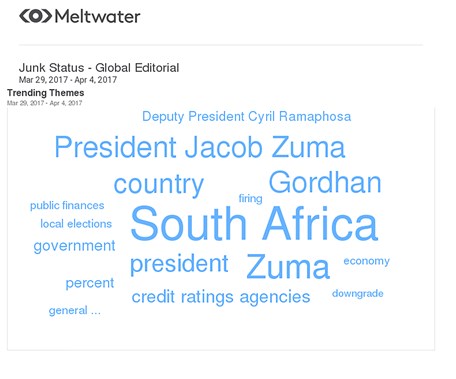According to Matthew Barclay, area director for Meltwater Africa, “It’s common to see mass mobilisation online when it comes to issues citizens are passionate about, but the scale of the reaction we’ve seen in response to South Africa’s credit downgrade has been paralleled by very few events in recent memory”.
Meltwater released that since the news of the downgrade broke yesterday afternoon, there have been in excess of 40,000 social media mentions on the downgrade alone – when we combine this with the overall conversation taking place around South African political climate on social media, the volumes are astonishing.
Barclay added, “The levels of engagement we have seen the last 24 hours confirm that social media is becoming the first point of call for all sectors of society to voice their opinions. Comments and posts are critical, vicious, emotionally charged, fake and factual as South Africans take to social media as form of therapy to come to grips with what has happened.”
Global social media conversation volume was unsurprisingly dominated by South Africa, followed by the United States, United Kingdom, India and Nigeria. While Twitter, the often go to platform for dissension and protest, played host once again to the vast majority of the social conversations taking place online around SA’s junk status downgrade.
“What’s interesting is that the conversation on Twitter is being driven by media houses and the public, rather than political parties,” said Barclay.
In terms of the impact on the international community’s news publications however, Barclay added that, “The far-reaching consequences of the status change are evident in the online editorial statistics, which saw over 20,000 news updates published out of the Unites States, 300% more than South Africa itself.”
Prevailing themes across news media included mentions of former SA Minister of Finance, Pravin Gordhan as well as references to the incumbent President of South Africa, Jacob Zuma. The data indicates that reporting of the downgrade was linked directly to the cabinet reshuffle made by President Zuma last week, with emphasis on the replacement of Minister Gordhan with former Minster of Home Affairs, Malusi Gigaba. In this way, the reporting of editorial news mirrored the cause-effect relationship established on social media between the President Zuma’s new appointments and S&P Global’s decision to revalue South Africa’s credit rating.

With the ratings agency Moody’s considering a similar downgrade to South Africa’s credit status, it remains to be seen how social conversations and volume will continue to evolve. Meltwater did identify the Democratic Alliance’s vote of no confidence in President Zuma as well as its calls for a march to Luthuli house, now Beyers Naudé Square this Friday as a conversation with growing momentum. The media intelligence provider has advised that they will be releasing more detailed insights toward the end of the week as data emerges.